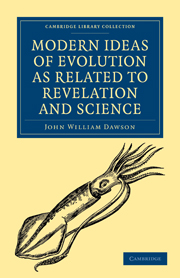Book contents
- Frontmatter
- PREFACE
- Contents
- CHAPTER I PRESENT ASPECTS OF THE QUESTION
- CHAPTER II WHAT IS EVOLUTION?
- CHAPTER III THE ORIGIN OF LIFE
- CHAPTER IV THE APPARITION OF SPECIES IN GEOLOGICAL TIME
- CHAPTER V MONISTIC EVOLUTION
- CHAPTER VI AGNOSTIC EVOLUTION
- CHAPTER VII THEISTIC EVOLUTION
- CHAPTER VIII GOD IN NATURE
- CHAPTER IX MAN IN NATURE
- CHAPTER X GENERAL CONCLUSIONS
- APPENDIX I WEISMANN ON HEREDITY
- APPENDIX II DR. McCOSH ON EVOLUTION
CHAPTER VII - THEISTIC EVOLUTION
Published online by Cambridge University Press: 29 August 2010
- Frontmatter
- PREFACE
- Contents
- CHAPTER I PRESENT ASPECTS OF THE QUESTION
- CHAPTER II WHAT IS EVOLUTION?
- CHAPTER III THE ORIGIN OF LIFE
- CHAPTER IV THE APPARITION OF SPECIES IN GEOLOGICAL TIME
- CHAPTER V MONISTIC EVOLUTION
- CHAPTER VI AGNOSTIC EVOLUTION
- CHAPTER VII THEISTIC EVOLUTION
- CHAPTER VIII GOD IN NATURE
- CHAPTER IX MAN IN NATURE
- CHAPTER X GENERAL CONCLUSIONS
- APPENDIX I WEISMANN ON HEREDITY
- APPENDIX II DR. McCOSH ON EVOLUTION
Summary
This, in its highest sense, can be nothing less than the development of the divine plan in the construction of the universe; and as it implies the action of an infinite power behind nature, under the guidance of an omniscient mind, it supplies a full and satisfactory ultimate explanation of phenomena, leaving only for consideration the methods of the development as carried on in time and by such secondary causes as may have been arranged by God.
But such theistic evolution is held in many different ways and in many grades of connection with the Darwinian and other theories. I may select here as one of its latest and ablest exponents Professor Joseph Le Conte, of California, a geologist of some repute and a clear thinker, who aims to combine the various divergent schools of evolution, whether Darwinian or Lamarckian, and to reconcile the whole with theistic beliefs. His proofs of evolution as a law of continuous development of objects and living beings from one another are not unlike those we have already criticised, and are not so much based on his own science as on the supposed analogies between the development of the individual and the species in biology. We need not deal with these, but may rather notice what is special and peculiar in his view of the matter.
His definition of evolution is somewhat different from that of Spencer and the ordinary Darwinians. Evolution, he says, is (1) continuous progressive change; (2) this is according to certain laws; (3) it is by means of resident forces, that is, forces natural to or inherent in the object and its environment.
- Type
- Chapter
- Information
- Modern Ideas of Evolution as Related to Revelation and Science , pp. 162 - 170Publisher: Cambridge University PressPrint publication year: 2009First published in: 1890

